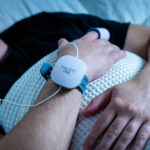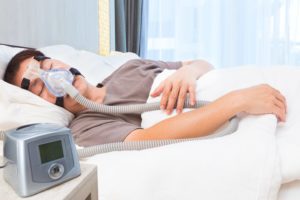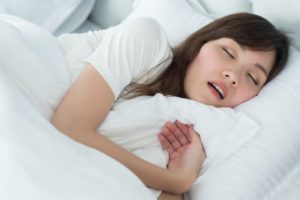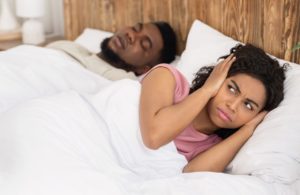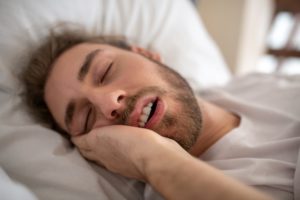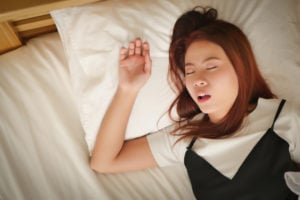When you buy through our links, we may earn a commission. Products or services may be offered by an affiliated entity. Learn more.
How Do Nasal Strips Work?
- Nasal strips are adhesive fabric strips placed on the nose that hold the nostrils open and increase airflow through the nose.
- Research about the effectiveness of nasal strips is mixed, but some evidence suggests they may reduce snoring by decreasing air resistance in the nasal passages.
- Nasal strips do not resolve snoring caused by complex underlying issues like obstructive sleep apnea.
Whether you’re battling congestion or trying to stop snoring, it’s natural to try to find a way to breathe more freely through your nose. This concept is the driving idea behind nasal strips, which can be worn overnight to try to improve breathing during sleep. But can these fabric strips really prevent snoring or deliver a better night’s rest?
We cover the details about nasal strips, whether they work, their potential side effects, and alternative treatment options for snoring.
Snoring? It Could be a Sign of Sleep Apnea
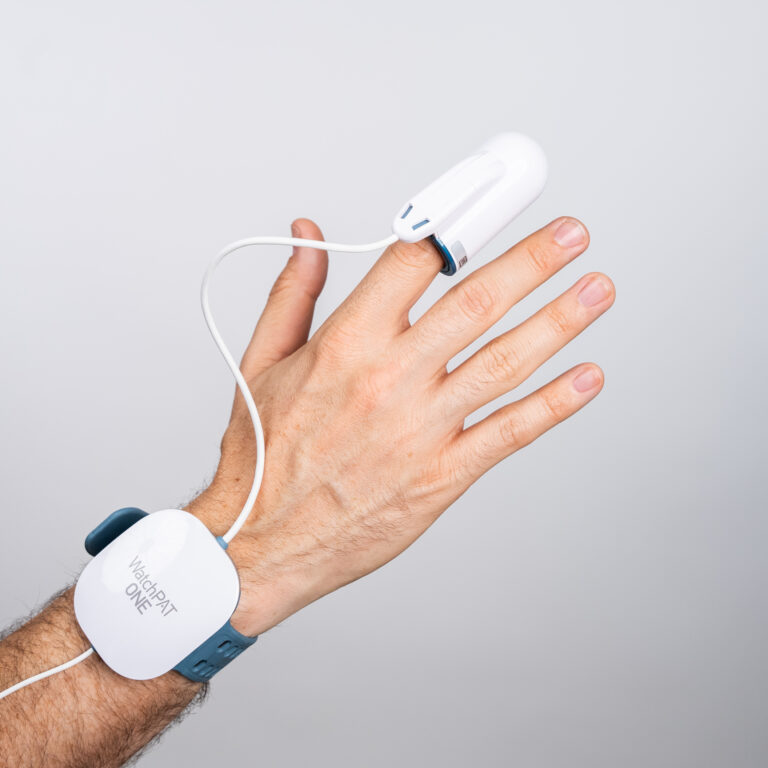
our partner at sleepdoctor.com
10% off Home Sleep Tests
Buy Now“Truly grateful for this home sleep test. Fair pricing and improved my sleep!”
Dawn G. – Verified Tester
What Are Nasal Strips?
Nasal strips are stiff pieces of fabric with an adhesive side that sticks to the bridge of the nose. The pull of the strip’s adhesive helps hold the nostrils open, keeping the nasal passages wider. As a result, more air can flow through the nose, especially when breathing in .
Nasal strips are also sometimes known by the technical name of external nasal dilators (ENDs). These strips were first popularized by Olympic athletes but later were marketed more widely, including as a method to combat snoring or a stuffed-up nose.
When a nasal strip is in the right position, it should gently pull outward on both nostrils. Nasal strips are available in different sizes and strengths. If a strip feels too long or too short, a different size or brand may be a better fit.
Do Nasal Strips Work?
Studies have shown that nasal strips work to widen the nostrils, allowing for easier airflow through the nose. Whether you’re awake or asleep, wearing a nasal strip may decrease the resistance you feel when breathing in through your nose .
However, it is not clear that nasal strips work to address specific problems, like snoring or poor sleep from nasal congestion . There is limited research about the effectiveness of nasal strips, and studies so far have had mixed results.
Do Nasal Strips Work for a Stuffy Nose?
Studies of airflow through the nose have demonstrated that nasal strips provide more space in the nostrils, which may reduce the resistance you feel when breathing with a stuffy nose.
However, most studies have found only limited real-world benefits for nasal strips compared to a placebo strip on the nose that does not exert the same outward tension on the nostrils. In a study of people with chronic nasal congestion who used nasal strips for two weeks, both the nasal strips and the placebo gave the sensation of making breathing easier.
Because the strips did not work better than the placebo, the evidence does not support the idea that the widening of the nostrils from nasal strips is enough to truly counteract the symptoms of a stuffy nose.
Similarly, researchers have generally found that nasal strips offer limited or no sleep improvement for people with a stuffed-up nose. Compared to a placebo, nasal strips did not enhance sleep quality or reduce daytime sleepiness for those with longstanding nasal congestion.
Do Nasal Strips Work for Snoring?
While some people find that they snore less when using nasal strips at night, studies have not consistently shown that nasal strips can stop or significantly reduce snoring.
Snoring happens when the force of air when breathing causes the tissue in the airway to vibrate, like the sound of a flag in the wind . Narrowed or blocked nostrils lead to resistance to airflow, which leads to more forceful breathing that can contribute to or worsen snoring.
In theory, nasal strips could help with this by widening the nostrils and reducing resistance when inhaling. Unfortunately, research has not definitively proven that nasal strips have a positive effect on snoring.
In some early research, bed partners of people who snore reported that the snoring was not as bad when their partner used nasal strips. However, these studies were small and had other limitations. Overall, there are few high-quality studies of the effect – if any – that nasal strips have on snoring. When analyzing all the available research, reductions in snoring have been small , or nasal strips have not had a greater impact than a placebo.
That said, the side effects of nasal strips are minimal, and in some people’s subjective experience, the strips do offer relief for snoring or congestion. Taken together, this means that trying nasal strips is a relatively low-risk option even if studies have not clearly shown them to be helpful.
It is important to note that nasal strips are not a treatment for snoring related to obstructive sleep apnea (OSA). OSA is a condition involving a blocked airway that interferes with breathing during sleep .
Effective treatment of OSA is important to prevent potentially serious health complications, so nasal strips should not be used in lieu of OSA treatment prescribed by a doctor. Some people with OSA may benefit from using nasal strips along with other sleep apnea treatment.
Do Breathe Right Strips Work?
Breathe Right Strips are one of the most well-known brands of nasal strips. However, the manufacturer of Breathe Right Strips published a study in 2019 that found using these strips did not significantly improve sleep quality or feelings of nasal congestion compared to a placebo.
As with other nasal strips, Breathe Right Strips are likely to help hold the nostrils open, which can enable smoother airflow when you breathe. Despite this, the existing research does not show that they work especially well in resolving nasal congestion or snoring.
Do Magnetic Nasal Strips Work?
There is not enough evidence from research studies to show whether magnetic nasal strips work.
Magnetic nasal strips use a different mechanism to hold the nasal passages open. A small metal disk is attached to the outside of each nostril with adhesive, and then a strip with magnets on each end goes over the bridge of the nose. The magnets exert an outward force on the metal disks, pulling the nostrils open. Some people find these strips preferable to conventional nasal strips.
No large or high-quality studies have been published about magnetic nasal strips. As a result, it is not possible to say whether they can address congestion or snoring or whether they are more or less effective than other nasal strips.
What Are the Side Effects of Nasal Strips?
Most people who use nasal strips experience no or only mild side effects. Possible side effects from nasal strips include :
- Skin irritation
- Redness
- Itching
- Mild discomfort
- Feeling a need to sneeze
If a nasal strip irritates the skin, it may be worthwhile to try another brand that uses a different material or adhesive.
Are There Alternatives to Nasal Strips?
Nasal strips are only one approach to trying to stop snoring. Examples of other methods include lifestyle changes, nasal decongestants, mouth and throat exercises, internal nasal dilators, and oral appliances.
Before trying any of these, people who snore should talk to a doctor to make sure that they do not have sleep apnea. Loud and frequent snoring is common among people with sleep apnea, and proper diagnosis and treatment are necessary to prevent sleep disruptions and other health problems from sleep apnea.
Lifestyle Changes
A doctor may recommend lifestyle changes as a first step to try to stop snoring. These may include:
- Sleeping on your side instead of your back
- Raising the head of the bed or sleeping on a wedge pillow
- Avoiding smoking and alcohol, especially before bedtime
- Losing weight, especially if you are overweight or have obesity
These changes may not help everyone, but they are relatively low-risk and may have other health benefits.
Nasal Decongestants
If snoring is caused by chronic congestion, allergies, or a short-term infection, treating the cause may reduce snoring.
Many nasal decongestants are not designed to be used for more than a few days. Doctors may recommend specific over-the-counter or prescription steroid nasal sprays for people with long-term congestion.
Mouth and Throat Exercises
Certain mouth and throat exercises can be used to strengthen the tongue and soft palate to help reduce snoring. Few studies have been conducted about these exercises, but data suggests that performing these exercises for 8 to 30 minutes a day for at least three months may reduce the frequency and intensity of snoring.
Internal Nasal Dilators
Internal nasal dilators are small devices placed inside the nose that help hold the nostrils open. Some evidence suggests that internal nasal dilators may reduce snoring similarly to (or in some cases better than) nasal strips, but more research is needed to fully understand the potential benefits of these devices.
Oral Appliances
People who continue to snore after trying other measures may benefit from an oral appliance.
These devices are worn only during sleep and keep the airway open either by adjusting the position of the jaw or tongue. Studies have found that custom-fitted oral appliances reduce both the frequency and severity of snoring, and they can also be a treatment for sleep apnea.
People often notice initial discomfort, difficulty chewing, or an increase in either drooling or dry mouth soon after starting to wear an oral appliance. Most of these side effects go away over time. However, some people may find that long-term use of an oral appliance can affect the alignment of their teeth. This makes it important to have regular follow-up visits with a dentist when using an oral appliance or mouthpiece for snoring.
Frequently Asked Questions
What’s the difference between nasal strips and internal dilators?
The difference between nasal strips and internal dilators is that nasal strips go on the exterior of the nose, while internal dilators are placed inside the nostrils. Both are designed to widen the nasal passages and improve airflow through the nose.
Is it safe to use nasal strips every night?
In general, as long as they do not cause skin irritation or other side effects, nasal strips can be used frequently or even nightly.
That said, if you have persistent nasal congestion or snoring, you should work with a health care professional to try to identify and treat the underlying cause. For example, an at-home sleep apnea test can help determine if snoring is related to obstructive sleep apnea.
Who should not use nasal strips?
Nasal strips should not be used by children under 5, people who are allergic to latex (unless the packaging specifies the product is latex-free), or anyone who has an open wound or irritated skin on the nose.
In addition, people with chronic nasal congestion or obstructive sleep apnea should not use nasal strips in place of other treatments prescribed by their doctor.

Still have questions? Ask our community!
Join our Sleep Care Community — a trusted hub of sleep health professionals, product specialists, and people just like you. Whether you need expert sleep advice for your insomnia or you’re searching for the perfect mattress, we’ve got you covered. Get personalized guidance from the experts who know sleep best.
References
7 Sources
-
Illidi, C. R., Romer, L. M., Johnson, M. A., Williams, N. C., Rossiter, H. B., Casaburi, R., & Tiller, N. B. (2023). Distinguishing science from pseudoscience in commercial respiratory interventions: an evidence-based guide for health and exercise professionals. European journal of applied physiology, 1–27. Advance online publication.
https://pubmed.ncbi.nlm.nih.gov/36917254/ -
Noss, M. J., Ciesla, R., & Shanga, G. (2019). Sleep quality and congestion with Breathe Right nasal strips: Two randomized controlled trials. Advances in Therapy, 36(8), 1975–1985.
https://pubmed.ncbi.nlm.nih.gov/31209698/ -
Camacho, M., Malu, O. O., Kram, Y. A., Nigam, G., Riaz, M., Song, S. A., Tolisano, A. M., & Kushida, C. A. (2016). Nasal Dilators (Breathe Right Strips and NoZovent) for Snoring and OSA: A Systematic Review and Meta-Analysis. Pulmonary medicine, 2016, 4841310.
https://pubmed.ncbi.nlm.nih.gov/28070421/ -
Snoring. Merck Manuals Professional Edition. Published June 2024.
https://www.merckmanuals.com/professional/neurologic-disorders/sleep-and-wakefulness-disorders/snoring -
Camacho, M., Malu, O. O., Kram, Y. A., Nigam, G., Riaz, M., Song, S. A., Tolisano, A. M., & Kushida, C. A. (2016). Nasal Dilators (Breathe Right Strips and NoZovent) for Snoring and OSA: A Systematic Review and Meta-Analysis. Pulmonary medicine, 2016, 4841310.
https://pubmed.ncbi.nlm.nih.gov/28070421/ -
Strohl, K. P. (2022, October). Obstructive sleep apnea (OSA). Merck Manual Professional Version.
https://www.merckmanuals.com/professional/pulmonary-disorders/sleep-apnea/obstructive-sleep-apnea-osa -
Todorova, A., Schellenberg, R., Hofmann, H. C., & Dimpfel, W. (1998). Effect of the external nasal dilator Breathe Right on snoring. European journal of medical research, 3(8), 367–379.
https://pubmed.ncbi.nlm.nih.gov/9707518/



